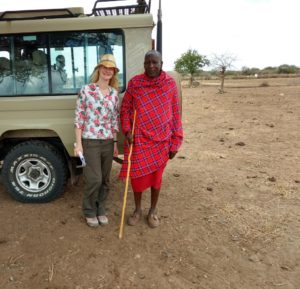Blog
Medicines and the Maasai: studying antimicrobial resistance in the pastoralist communities of Kenya
Written by Naomi Bull
January 23, 2019
In the field
It was a warm, peaceful morning and I found myself in a small farmyard, perching on a plastic container, which had been repurposed as a stool. With the help of a local translator, I was asking the elderly lady opposite me some questions about her animals. Next to me, a couple of young goats were trying to eat my shoelaces and trousers. I moved to protect my paper survey as they started eyeing it with interest. Behind a stack of tyres, a couple of children crouched, peering at me with wide-eyed curiosity. Suddenly, the lady I was interviewing broke into a big smile. “Turn around” said the translator. I looked behind me to see that the early morning clouds had parted. There, right in front of me, I saw the snow-capped peak of Africa’s highest mountain, Mt Kilimanjaro. It’s moments like these you realise you’re a long way from home.
I certainly was far from the UK. I was in Kajiado county, Kenya, as part of a team from the Royal Veterinary College (one of LIDC’s member institutions). We were working with a local NGO to research the issue of antimicrobial resistance in subsistence farming communities. The project aims to draw comparisons between the current situation and that of twenty years ago, when data was collected from the same communities.
Kajiado forms part of Maasailand, a vast rural area populated by the pastoralist Maasai people and their herds of cattle, sheep and goats. It is an area of breath-taking natural beauty lying within the Great Rift Valley. The sheer scale of the open space leaves a lasting impression. The sky seems so much bigger than back home looking out of a London office window!
Old traditions facing new challenges
For all its beauty, Kajiado is also a land of hardship and difficulty, where survival for the Maasai depends almost exclusively on subsistence farming. They are a people who have maintained an extraordinarily rich cultural heritage in the face of very modern challenges. It feels a real privilege to enter their homesteads and be invited inside a ‘manyatta’, a home made from woven sticks coated with cow dung and mud. Theirs is a traditional way of life which has been preserved for many centuries.
Our research involved going from homestead to homestead conducting household interviews. Fortunately for us, the Maasai extended a very warm welcome. People were extremely generous with their time, as well as their tea and snacks! They served us very sweet tea, full of tasty sheep’s milk. What’s more, our interviewees often offered us a bowl of ugali (a type of cornmeal porridge made from maize flour). On a couple of days, our hosts very kindly invited us to ceremonies where a goat had been slaughtered and families shared some of the meat cooked traditionally on a stick next to the fire.
Researching antimicrobial resistance
We wanted to learn more about the availability of veterinary care and use of antibiotics for animals in this region. Most people had no access to a qualified vet. Instead they relied instead on a combination of local knowledge passed down through the generations and advice from salespeople in local livestock pharmacies. While the Maasai are expert herdsmen, increased access to veterinary services would undoubtedly be of benefit. There was little to no awareness of antimicrobial resistance. What’s more, there was no formal diagnosis of animals to guide treatment decisions.
Indeed, the Maasai demonstrated a real desire to learn as much as they could from us. They take great pride in their animals, particularly their cattle. Upon discovering I was a vet, interviewees often invited me to inspect and comment on their herd. It isn’t hard to make a Maasai man very pleased by saying they are the best you’ve seen! Unfortunately, long droughts, loss of land and the ongoing battle with livestock diseases are making this way of life increasingly challenging. Many people told us they had far fewer animals now than in the past and they feared for the future. The challenge of adapting to 21st century living will not be easy, but these are a very resilient people. I very much hope that if I am fortunate enough to return in another twenty years, they will still be there.
Naomi Bull is a Research Fellow at the Royal Veterinary College. A qualified veterinary surgeon, her research interests focus on the application of One Health principles to development challenges. She is currently working on a project investigating risk factors driving antimicrobial resistance in subsistence farming communities in the Global South.

